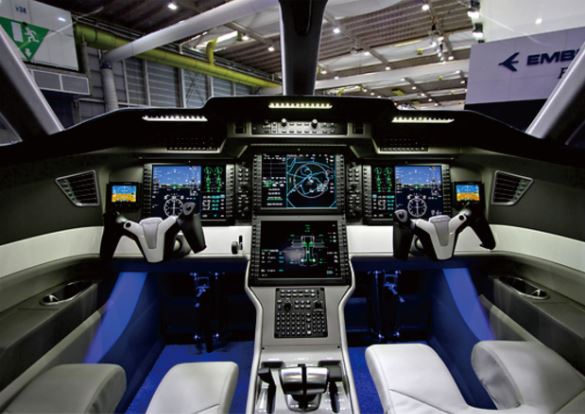Pilatus PC-24 Specs, Interior, Cockpit, and Price – Pilatus PC-24 is a twin-engine business jet developed by Pilatus Aircraft, a Swiss-based aircraft manufacturer. The aircraft was first introduced at the European Business Aviation Convention and Exposition (EBACE) in Geneva in May 2013.
The first Pilatus PC-24 prototype was launched at the Buochs airfield near Stans in August 2014. The first flight of the Pilatus PC-24 aircraft was completed in May 2015. The aircraft received FAA and EASA type certifications in December 2017. Aircraft parts are assembled and made at the Pilatus factory in Stans, Switzerland.

The new aircraft is equipped with a main double-wheel landing gear with an anti-skid braking system. It features a separate cargo door with a height of 4.2 feet and a width of 4.1 feet, and optimized wings ensure superior short field performance. This aircraft has a length of 16.82 m, 5.3 m high, and a wingspan of 17 m.
The aircraft is available in various versions to suit various needs such as medical, cargo, commuter and special mission evacuations. This is made specifically for use on short and unpaved runways. This aircraft has a takeoff weight of 8,005kg, landing weight of 7,370kg and a maximum load of 1,135kg.
The propulsion system provides a distance of 3,610 km and a maximum cruise speed of 787 km / hr. The aircraft landing distance is 770m and the maximum certified height is 13,716m. The climbing rate is around 4.075 fpm at sea level.
Contractors and suppliers involved in the development of the Pilatus PC-24 aircraft including Astronics Advanced Electronic Systems were awarded a contract to supply the starter-induction generator system (ISGS) for aircraft in June 2013. ISGS increases power system reliability and reduces aircraft maintenance costs.
The complete fuel system is supplied by Secondo Mona. The cooling and environmental heating systems for aircraft are supplied by Air Comm Corporation. Sirio Panel is contracted to supply, develop and provide support for cockpit control panels, as well as external lighting systems for aircraft. The nasal cavity is made by Saint-Gobain using Norton Armor.

The aircraft cabin is equipped with extra large windows to allow bright and natural light. Passenger seats have the ability to change quickly. The cabin is equipped with an externally serviced toilet.

The first Pilatus PC-24 prototype was launched at the Buochs airfield near Stans in August 2014. The first flight of the Pilatus PC-24 aircraft was completed in May 2015. The aircraft received FAA and EASA type certifications in December 2017. Aircraft parts are assembled and made at the Pilatus factory in Stans, Switzerland.

Pilatus PC-24 Specs
Pilatus PC-24 features a merger of the previous version of Pilatus, but is more flexible than its predecessor, the PC-12 executive turboprop.The new aircraft is equipped with a main double-wheel landing gear with an anti-skid braking system. It features a separate cargo door with a height of 4.2 feet and a width of 4.1 feet, and optimized wings ensure superior short field performance. This aircraft has a length of 16.82 m, 5.3 m high, and a wingspan of 17 m.
The aircraft is available in various versions to suit various needs such as medical, cargo, commuter and special mission evacuations. This is made specifically for use on short and unpaved runways. This aircraft has a takeoff weight of 8,005kg, landing weight of 7,370kg and a maximum load of 1,135kg.
Pilatus PC-24 Engine
Pilatus PC-24 is powered by two FJ44-4A turbofan engines manufactured by Williams International, and each engine produces a thrust of around 3,400lbf. It is equipped with a digital engine control system (FADEC) full authority.The propulsion system provides a distance of 3,610 km and a maximum cruise speed of 787 km / hr. The aircraft landing distance is 770m and the maximum certified height is 13,716m. The climbing rate is around 4.075 fpm at sea level.
Contractors and suppliers involved in the development of the Pilatus PC-24 aircraft including Astronics Advanced Electronic Systems were awarded a contract to supply the starter-induction generator system (ISGS) for aircraft in June 2013. ISGS increases power system reliability and reduces aircraft maintenance costs.
The complete fuel system is supplied by Secondo Mona. The cooling and environmental heating systems for aircraft are supplied by Air Comm Corporation. Sirio Panel is contracted to supply, develop and provide support for cockpit control panels, as well as external lighting systems for aircraft. The nasal cavity is made by Saint-Gobain using Norton Armor.

Pilatus PC-24 Cabin and Interior
Pilatus PC-24 has a spacious cabin that can accommodate up to ten passengers. The cabin has a volume of 14.20m3. It is 1.55m tall, 1.69m wide and 7.01m, and includes a luggage compartment with 1.40m3 of space.The aircraft cabin is equipped with extra large windows to allow bright and natural light. Passenger seats have the ability to change quickly. The cabin is equipped with an externally serviced toilet.









No comments:
Post a Comment